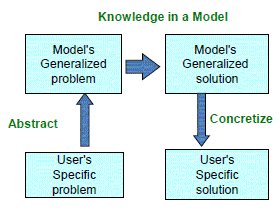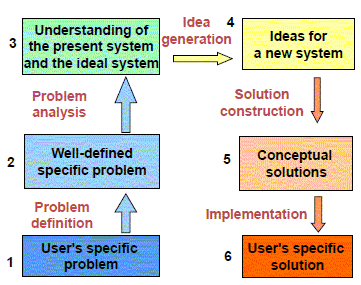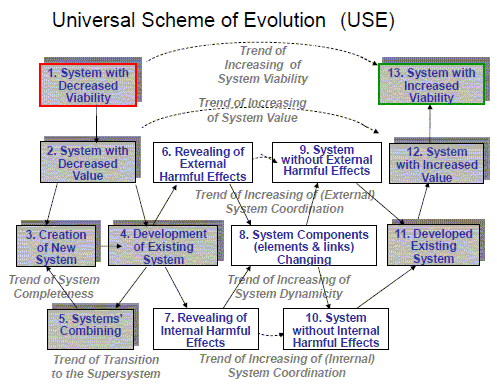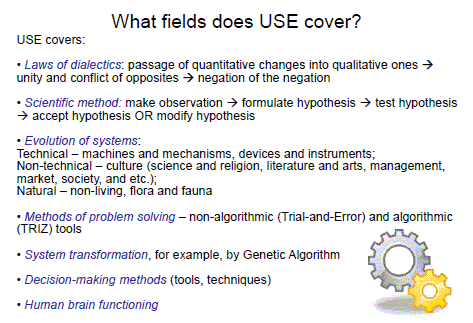To my thanks, I have been receiving emails occasionally from various readers in Japan and from overseas. In the present page, and also in the Japanese page  , I am going to post some of those communications suitable for open discussions. I wish to make this Web site active, user-friendly, and useful for many new and frequent readers by the support of you, authors, communicators, and readers.
, I am going to post some of those communications suitable for open discussions. I wish to make this Web site active, user-friendly, and useful for many new and frequent readers by the support of you, authors, communicators, and readers.
Note (Dec. 23, 2013, TN): Index of "Letters from Readers" pages (in English and in Japanese)  has been built, for better overview and easier access. Discussions between Darrell Mann (Oct. 29) and Toru Nakagawa (Nov. 5) have been moved to a separate page
has been built, for better overview and easier access. Discussions between Darrell Mann (Oct. 29) and Toru Nakagawa (Nov. 5) have been moved to a separate page  with an explicit title.
with an explicit title.
CrePS-SB project for trial use the Southbeach Modelling (Nakagawa); Letters from readers;
General methodology for creative promblem solving (CrePS) Systematized documents (Nakagawa):
CrePS vision (ETRIA TFC
2013 slides) (Nakagawa)
 Darrell Mann (UK) Oct. 29, 2013
Darrell Mann (UK) Oct. 29, 2013
Hi Toru, Belated thanks for your email - it has been a busy year!
Sadly, my busy schedule means that I have not been able to make it to Paris for the conference. It would have been very nice to catch up with you and discuss your latest initiative.
From my side, and all of our ongoing research, I think the two biggest issues holding back the innovation world are:
1) lack of ability of organisations and individuals to identify the 'right' problem
2) lack of organisational capability to execute the ideas that they generate (the basis of my Innovation Capability Maturity Model books)
TRIZ and the 'ideation'/problem-solving part of the process seem to us to be the easiest part of the equation.
I would be interested to hear your opinion these research findings. Do you think Japan is the same, or is problem-solving the main area requiring research and new tools, methods and approaches?
Best regards darrell
 Toru Nakagawa (email to Darrell Mann) Nov. 5, 2013
Toru Nakagawa (email to Darrell Mann) Nov. 5, 2013
==> See a separete page  : Letters from Readers (Discussion on CrePS) (Moved on Dec. 23, 2013)
: Letters from Readers (Discussion on CrePS) (Moved on Dec. 23, 2013)
"Research focus is on problem finding and solution execution rather than problem solving /
Thinking methods for problem solving are the basis we should establish now"
Darrell Mann (Systematic Innovation, UK), Oct. 29, 2013
Toru Nakagawa (OGU, Japan), Nov. 5, 2013
 S.Alireza Kashizad (France <- Iran) Nov. 5, 2013
S.Alireza Kashizad (France <- Iran) Nov. 5, 2013
Dear Toru Nakagawa, 15 years;
Congratulation! Thanks Professor for TRIZ Development in Japan by managing the "TRIZ Home Page in Japan". But not just in japan! That's useful for TRIZ followers around the world.
Best Wishes, S.Alireza
 Ramu Iyer (USA) Nov. 8, 2013
Ramu Iyer (USA) Nov. 8, 2013
Professor Nakagawa, I have recently become a user of Southbeach Modeler. As a result, I don't need a temporary license.
I'd be glad to become a member of the CrePS-SB Project and provide a report after 3 months of usage. I am thinking that involvement in CrePS-SB Project will provide the impetus to actively use Southbeach Modeler.
I don't know if there is a TRIZ template already included in Southbeach Modeler. Is there an English version of the CrePS-SB Project?
Thanks! Ramu Iyer http://linkd.in/ramuiyer
 Toru Nakagawa (reply mail to Ramu Iyer) Nov. 8, 2013
Toru Nakagawa (reply mail to Ramu Iyer) Nov. 8, 2013
Dear Mr. Ramu Iyer, Thank you for your message.
I am glad to learn that you find the CrePS-SB Project stitulating some people. You are now a member of the Project for communication. ('Members of 10 people' just means the capacity of the licenses at a time.)
When you send me your communication/report in English I will be happy to post it in my Web site in English. Please refer to the following pages: CrePS-SB project  , Southbeach Forum
, Southbeach Forum  , "TRIZ Home Page in Japan" top page
, "TRIZ Home Page in Japan" top page 
Best wishes, Toru Nakagawa
 David Verduyn (USA) Nov. 8, 2013
David Verduyn (USA) Nov. 8, 2013
Hello Toru, I think we met about 10 years ago at some TRIZ conference or Invention Machine Conference. I train and coach in Systematic Innovation approaches. I am familiar with Ideation's Problem Formulator software.
I am curious about your opinion on the SouthBeach software. When I was looking at their website and google searches I came across your name as one of the "users". What do you think of the software? Do you use it? Is it easy to become proficient in it? Any comments would be appreciated.
 Toru Nakagawa (reply mail to David Verduyn) Nov. 9, 2013
Toru Nakagawa (reply mail to David Verduyn) Nov. 9, 2013
Dear David, Thank you for your message. It must be TRIZCONs. I attended at it almost every year from 1999 to 2009.
I learned TRIZ by much help of TechOptimizer aroud 1997-1999. I know some of IWB but have not been a user of it.
The southbeach software was built under a much influence of the Problem Formulator, but in a more universal way, I think. I learned about Southbeach software several years ago, and later read Howard Smith's paper "Red, Green, and Blue"  with much interest.
with much interest.
I have posted several pages on Southbeach software and modelling in my Web site "TRIZ Home Page in Japan". Please refer to: CrePS-SB project  , Southbeach Forum
, Southbeach Forum 
I used the Southbeach Modeller to draw a number of diagrams and found it easy to use. But I do not have much time to use it at moment.
My approach of 'general methodology' of creative problem solving is close to 'systematic innovation' approach and also matches well with the Southbeach approach for 'a universal tool for modelling'.
Looking forward to your thoughts, Best wishes, Toru Nakagawa
On the 15th Anniversary of this site (Nakagawa); Creative Company and Methods (M. Takahashi);
Personal Report of Japan TRIZ Symposium 2013 (Nakagawa, in Japanese); Personal Report of ETRIA TFC 2013 (Nakagawa, in Japanese);
Letters from Readers (D. Mann, etc.; Nakagawa)
 Shahid Saleem Arshad (Australia) Nov. 27, 2013
Shahid Saleem Arshad (Australia) Nov. 27, 2013
Dear Professor Nakagawa, I would like to offer my thoughts on the Letters to the Editor published in the past two editions (Oct. 20 and Nov. 17) of the TRIZ Homepage in Japan. I have classed these under their respective names:
To: Dr. Yury Danilovsky (Russia/Korea):
This is superb training material, developed by you and your associates with considerable effort. I feel that the expected strength of impact is diluted somewhat by the sudden release of a quantity (8) of papers and the joint use in some slides of the English, Russian, Korean, and Thai languages.
International readers of the TRIZ Homepage in Japan will no doubt gain further understanding into problem solving by reading these papers, with some minor editing in English and by removing if possible of notation in the other three languages. Gradual, one-by-one release over time, and slightly larger slides will further enhance the overall impact and usefulness.
To: Dr. Ellen Domb (USA):
My understanding is that the quality movement developed strongly and independently in different parts of the world, over time, and was adopted because of its intrinsic worth and value. Even at its earliest stages, statistical methods and rigour were strictly enforced.
TRIZ has shown little over the past 20 odd years to prove its worth as a unique, worthwhile body of knowledge. It appears not to have the strength to stand on its own, and results are not evidenced through direct application but implied through inference to work done mostly by others.
From an engineering point of view, when we see a weakness in any system, we like to explore the reasons and devise solutions. This is problem solving and requires an acceptance of the existence of a problem, which most TRIZ experts tend to deny, or avoid.
Would you kindly share your thoughts on some aspects of TRIZ that do require further development?
To: Mr. Darrell Mann (UK):
In your letter (Oct. 29) you wrote:
"From my side, and all of our ongoing research, I think the two biggest issues holding back the innovation world are:
1) lack of ability of organisations and individuals to identify the 'right' problem
2) lack of organisational capability to execute the ideas that they generate (the basis of my Innovation Capability Maturity Model books)
TRIZ and the 'ideation'/problem-solving part of the process seem to us to be the easiest part of the equation."
This last part is quite interesting. If ideation and problem-solving are the easiest parts, then the innovation problem should be considered as fundamentally solved. The rest are details.
May I ask which part of your research led to this conclusion? Would you also kindly elaborate on the two biggest issues which you mention. Many thanks.
With best regards,
Shahid --- Shahid Saleem Arshad, PhD, MSIE (Sydney, Australia)
 Shahid Saleem Arshad (Australia) Nov. 28, 2013
Shahid Saleem Arshad (Australia) Nov. 28, 2013
Dear Professor Nakagawa, I would like to comment on your paper on CrePS, presented at ETRIA TFC 2013, because it contains the ideative seeds for further development of our field.
The first seed is formed by the following points:
1) You present a cogent argument for the further international development of TRIZ, Problem Solving, and related technologies in a collaborative and broadly aligned manner.
2) You have presented a framework "CrePS" to serve as a starting point. Inputs and feedback will decide its evolution.
3) Additionally, you have prepared fairly detailed structure within this framework to serve as a template which others can instantiate with their own embodiments. In this manner work done independently by others can retain its proprietary nature, yet also share a relevance and occupy a position within a generic developmental framework.
4) The level of detail structuring provided is quite remarkable as is your descriptive summation of current trends in innovation sciences.
You have also observed:
"Then I suddenly noticed that in such wide range of possible application areas people do not want TRIZ itself but they want more general methods, or rather general capabilities, of creative problem solving.
People want a more consistent and general way of how to think creatively for solving various problems."
This above is the second seed for further development.
Against the above, we should also consider the following counter-points:
1) Recent development in TRIZ, if they can be described as such, are fragmented, disparate, even conflicting. The few well known TRIZ experts may feel that they have more to gain by presenting an image of exclusivity and independent achievement. As well, the fame and stature of the expert can compensate to some degree any weakness in the subject itself.
2) More advanced models of problem solving can seem intimidating to the learner.
3) We learn better visually and by example, of which there is a continuing shortage.
4) The ideation stage, where we cross from the problem to the solution, remains a single stage [from Box-3 to Box-4], in the 6-box model. I agree that the PRE-PROCESSING (from Box-1 to Box-2) and POST-PROCESSING (from Box-5 to Box-6) done in your 6-box model strongly contribute to the overall efficiency of problem solving. [See Nakagawa's comment below. (Jan. 26, 2014)]
May I therefore suggest a third seed:
A. To explore how adding an intermediate stage or stages can help the ideation process usually shown by just the two boxes (problem) and (solution) at the upper horizontal level of both models. That is, to go from Box-3 to Box-4 along the ideation axis at the top. How can one proceed?
I hope these comments are not too far off the mark and will generate some interest in the readers of THPJ.
With best regards, Shahid --- Shahid Saleem Arshad, PhD, MSIE (Sydney, Australia)
 Comment by Toru Nakagawa, inserted on Jan. 26, 2014.
Comment by Toru Nakagawa, inserted on Jan. 26, 2014.
The paragraph 4) above has some confusion by Dr. Arshad and needs clarification. When I posted his communication here on Dec. 9, 2013, I inserted the phrases of mentioning the Boxes in the green fonts. But reading the paragraph again today, I have found it necessary to clarify the points some more.
I suppose that Arshad wanted to say in the paragraph as:
4) The ideation stage, where we cross from the problem to the solution, remains a single stage [from Box-3 to Box-4], in the 6-box model. I agree that the PRE-PROCESSING (from Box-1 to Box-2 to Box-3) and POST-PROCESSING (from Box-4 to Box-5 to Box-6) done in your 6-box model strongly contribute to the overall efficiency of problem solving.
Instead of 'PRE-PROCESSING stage' (of the traditional Four-box Scheme), I use the Problem definition step (from Box-1 to Box-2) [in the Initial part of CrePS] and the Problem analysis step (from Box-2 to Box-3) [in the Main part of CrePS]. Also instead of 'POST-PROCESSING stage', I use the Solution construction step (from Box-4 to Box-5) and Solution implementation step (from Box-5 to Box-6). See the two schemes in the following figures:
 |
|
 |
Traditional Four-Box Scheme |
|
Six-Box Scheme of CrePS (Nakagawa) |
Thus in my 6-box scheme, before the transition from Box-3 to Box-4 in the ideation step, we are supported by the analysis step (from Box-2 to Box-3, for obtaining full understanding of the present and the ideal systems) in addition to the problem definition step. And after the ideation step, we are guided through the solution construction step (Box-4 to Box-5).
This means that some significant parts of the ideation process in the traditional Four-box scheme are carried out in the steps before Box-3 and also after Box-4 in the new scheme, and that the ideation step (i.e., transition from Box-3 to Box-4) in the new scheme is made simpler and easier.
 Alex Zakharov (USA) Dec. 3, 2013
Alex Zakharov (USA) Dec. 3, 2013
Dear Professor Nakagawa; I am Alex Zakharov, 4th level TRIZ specialist.
With my great interest I've studied your presentation "General Methodology for Creative Problem Solving and Task Achieving" (TRIZ Future Conference 2013, France, Oct. 29-31, 2013) 
 .
.
Especially, I was amazed by the 'Expected Areas of Applying TRIZ' slide (page 07)  . I do like your conclusion, that "... we need a more general method!" It's demands wide knowledge and rich experience not only to try describe such numerous fields and areas, but to reveal their general features, find generalized problems, and at last - suggest the generalized method to solve these problems.
. I do like your conclusion, that "... we need a more general method!" It's demands wide knowledge and rich experience not only to try describe such numerous fields and areas, but to reveal their general features, find generalized problems, and at last - suggest the generalized method to solve these problems.
I fully agree with your statement (page 08) :
:
Our new target at a higher level, guided by the reflection of the present situations:
"To establish a general methodology of creative problem-solving / task-achieving, to spread it widely, and to apply it to problem-solving and task-achieving jobs in various domains in the whole country (and the world)."
On this evidence, I wish to suggest to your attention my approach, which practically fits to demands described above. Please, find a few minutes for attached presentation.
Sincerely, Alex Zakharov http://triz-evolution.narod.ru/
 Note (TN, Dec. 5, 2013): Alex Zakharov (USA)
Note (TN, Dec. 5, 2013): Alex Zakharov (USA)
Alex Zakharov's presetnation slides entitled "Universal Trends of Evolution in form of USE and USESoft" is posted in a separate page of this site  . Two selected slides are shown below for clarifying the present discussion.
. Two selected slides are shown below for clarifying the present discussion.





